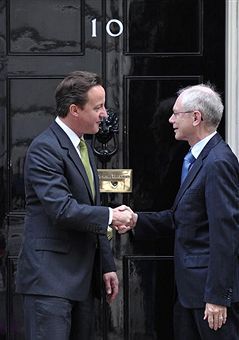 Britain is going to stay in the EU for the next ten years at least. Of that I’m sure.
But after that, when David Cameron’s retired, William Hague has taken to writing books, George Osborne’s had his chance and the 2010 intake run the party, the Tories are going to be more openly
hostile to the EU. Labour will too; it has a larger reservoir of pro-EU sentiment among its ranks, but one that is shallower than it was.
Britain is going to stay in the EU for the next ten years at least. Of that I’m sure.
But after that, when David Cameron’s retired, William Hague has taken to writing books, George Osborne’s had his chance and the 2010 intake run the party, the Tories are going to be more openly
hostile to the EU. Labour will too; it has a larger reservoir of pro-EU sentiment among its ranks, but one that is shallower than it was.
Focusing on the Tories, it is worth noting that nearly all of the names being bandied about as future Tory leaders have a visceral dislike of the EU. By and large they will, by then reflect popular opinion (if they don’t already): as veteran EU watcher Charles Grant notes, there is a limit to how long an elite can cross the population.
The anti-EU mood will become more entrenched with each new EU development. First, Britain is very unlikely to join the expansion of the Eurogroup, and will find itself outside a key decision-making forum. Not being “at the table” may rob the Euro-realists like me of a key argument for Britain staying in the EU: namely that it gives the UK a seat.
Second, the EU Arrest Warrant will continue to present successive governments with a problem. British intelligence services are in favour of the warrant, but it clashes with eurosceptic instincts. This may come to a head in 2014 when the European Commission will report on the implementation of the warrant to contribute “appropriate follow-up”.
Then there is the question of the benefits of multilateralism. William Hague has championed what I would call “instrumental multilateralism”, a more functional and less emotional approach to cooperation. The key is to fulfil UK aims; this should be the policy of any government. But multilateral systems are more fragile than they look. They require governments to breathe life into them. A purely transactional policy may both make multilateral cooperation less effective and serve to undermine popular support for the work. The EU may suffer here on a par with NATO.
Then there is the nature of the European market. Trade with continental Europe is the most important commercial relationship Britain has. London has helped to shape the EU’s liberalisation and it has benefited tremendously. But moves across the continent to clamp down on key parts of the market, the free movement of people being one, may undermine UK enthusiasm.
Last week, I attended an event where Danny Alexander spoke about the benefits of having a “pro-European party” in British politics. Without wanting to overstate the Lib Dem role in British politics, a persistent pro-EU voice, not least in Parliament, has made a difference. But with the Lib Dems facing an electoral rout and with some party leaders sounding decidedly less enthusiastic about the EU than their forbears, this will also add to the anti-EU sentiment.






Comments